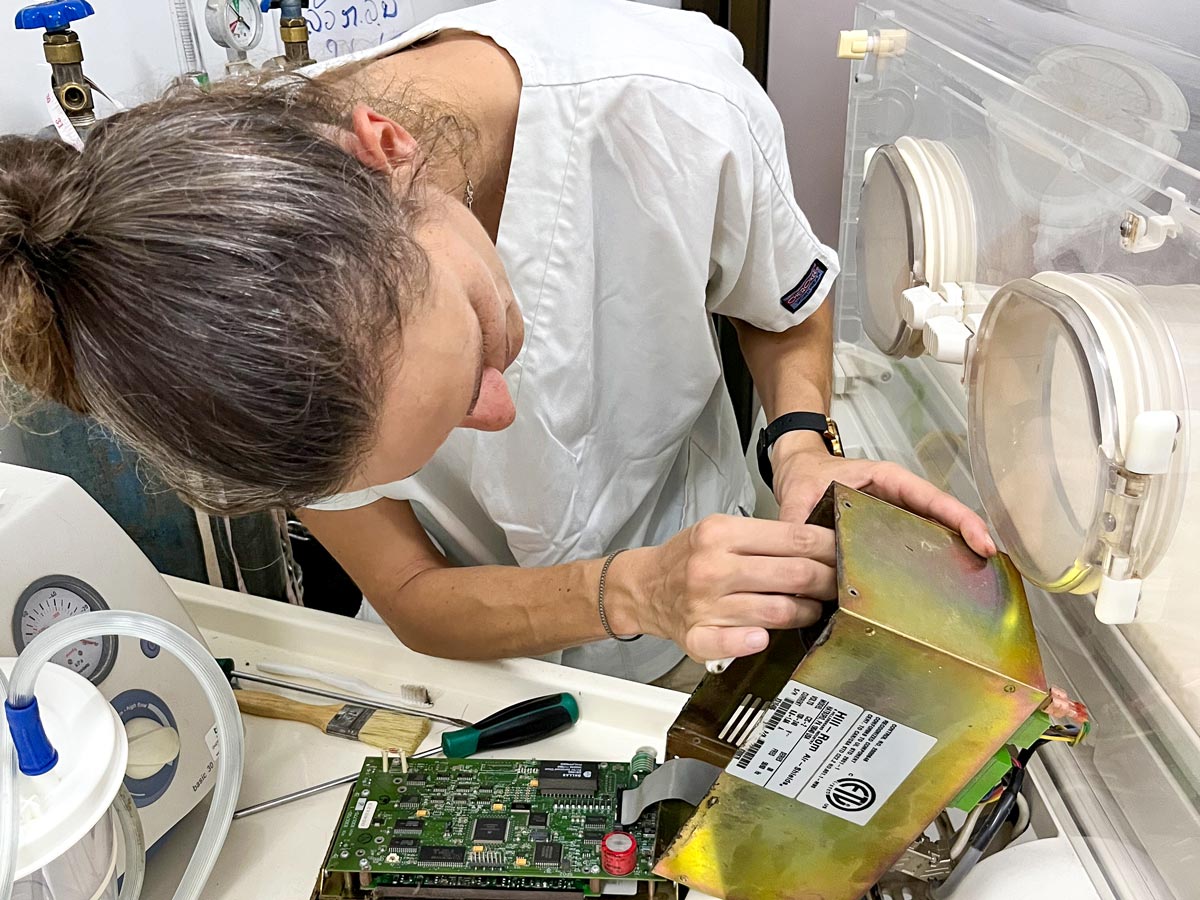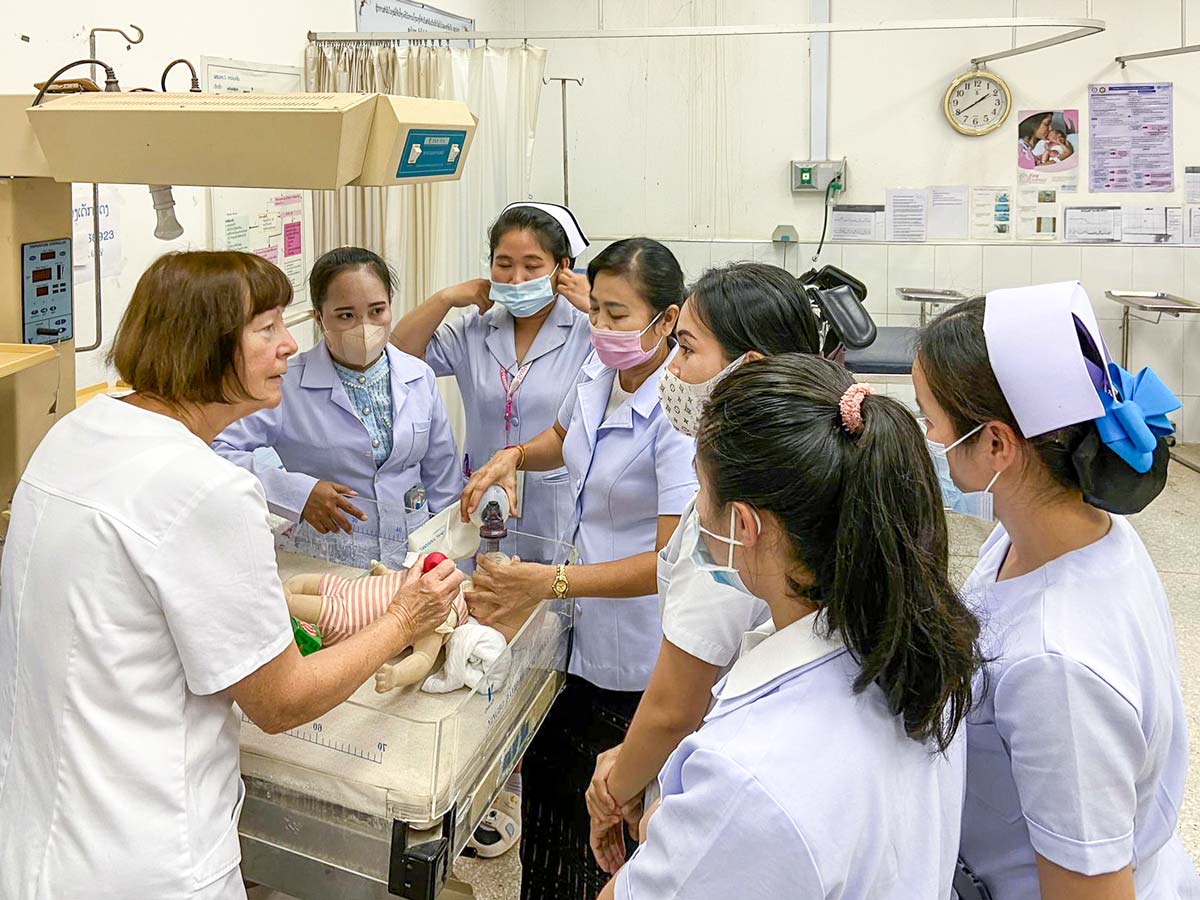
Neonatology working group
Adequate care for premature and newborn babies in Laos
The first month of a child’s life is the most dangerous: breathing, circulation and digestion often do not function properly after birth, and there is also a risk of infection. Without medical help, many newborns would not survive or would suffer permanent damage. This is especially true for premature babies.
This is no different in Laos than in Switzerland – except that there are still hardly any neonatology wards in Laotian hospitals. Our neonatology team has been working for 25 years to ensure that premature and newborn babies in Laos receive professional care.

The early years
The Swiss Laos Hospital Project has its origins in gynecology and obstetrics. A group of gynecologists and midwives led by Dr. Urs Lauper have been working at the Mother and Child Hospital in Vientiane since 2000 and were quickly able to make improvements in the care of pregnant women and women in childbirth.
However, many newborns still died shortly after birth. This is why neonatologists have started working in Laos in 2003. At that time, there was no functioning neonatology ward in the whole of Laos. Even the Mother and Child Hospital lacked everything: trained staff, adequate facilities, medical equipment, medication and hygiene.
Over the years, our neonatology team has not only trained its Laotian colleagues in numerous workshops and bedside teaching sessions, but has also expanded the small department with its four beds into a well-functioning neonatology unit.

Successful establishment of a modern neonatology unit in Vientiane
An important step was the relocation to the new Mother and Newborn Hospital (MNH), which was finally opened in 2015 thanks to financial support from the SLHP.
Today, there is a well-equipped neonatology unit with a trained neonatologist who, together with her team of doctors and nurses, can provide professional care for up to 35 newborns – including respiratory support (ventilation and CPAP), central catheters and intravenous feeding. The necessary diagnostic facilities are also available, from ultrasound and blood gas analysis to eye examinations for premature babies. The MNH is also the training center for the staff of the other neonatal wards in the country.
After 20 years of development work, we can say that neonatology at the Mother and Newborn Hospital is a success. However, the unit is only able to survive thanks to the continuous support of the Swiss Laos Hospital Project: Consumables are costly, and the maintenance and repair of equipment is prohibitively expensive by Laotian standards. The same applies to medicines, intravenous nutrition and blood gas cartridges, which are needed to determine the oxygen supply of newborns. Without donations from Switzerland, the MNH would be forced to close its neonatal unit.

A neonatal network for Laos
Our work is not limited to the capital Vientiane. The aim is to set up a neonatology ward in each of the large provincial hospitals with high birth rates, which can provide specialist care for sick newborns and premature babies. These departments will also serve as training centers for nurses, midwives and doctors in the smaller district hospitals.
Over the years, a network of nine neonatal wards has developed with which we work together on different topics and with varying degrees of intensity.
Such collaborations often start with a construction project, as most public hospitals in Laos are in a desolate state of repair. By not only co-financing the renovation or new construction of the neonatology ward, but also providing advice and support, we ensure that hygiene is guaranteed and that appropriate work processes are possible. Equally important, however, is the adequate equipment of these departments and the continuous training of staff.
Thanks to generous donations, the Swiss Laos Hospital Project was able to make major financial contributions to the provincial hospitals in Savannakhet, Luang Namtha, Pakse and Phonsavan. Our neonatology team is regularly on site in these hospitals to ensure that these investments are sustainable.

Training and further education in neonatology
As important as a functional infrastructure is, it is ultimately the expertise and commitment of the hospital staff that determine the quality of medical care.
Therefore, our working group invests a considerable amount of time in knowledge transfer in the form of bedside teaching, full-day workshops and webinars. This is all the more important as there is still no specialist training in neonatology in Laos, and there are only three neonatologists in the entire country.
In addition, the Swiss Laos Hospital Project regularly finances further training for Laotian doctors and nurses in Thailand.

Perinatal medicine and follow-up
Together with our gynecology/obstetrics team, we are aiming to intensify the exchange between our two specialist areas. The concept of perinatal medicine – which takes a holistic view of a child’s health before, during and after birth – is still not widespread in Laos. In joint workshops for gynecologists, midwives and neonatologists, we are trying to improve cooperation between the disciplines.
Another focus is the follow-up of premature babies and critically ill newborns.

Our working group
The neonatology team is headed by Dr. Marion Mönkhoff, MD. It consists of paediatricians and nurses with a specialization in neonatology, intensive care medicine or developmental paediatrics. Some of them have been volunteering regularly in Laos for many years. The medical technicians who accompany our teams and ensure the maintenance of the equipment in the neonatal departments are also indispensable.

